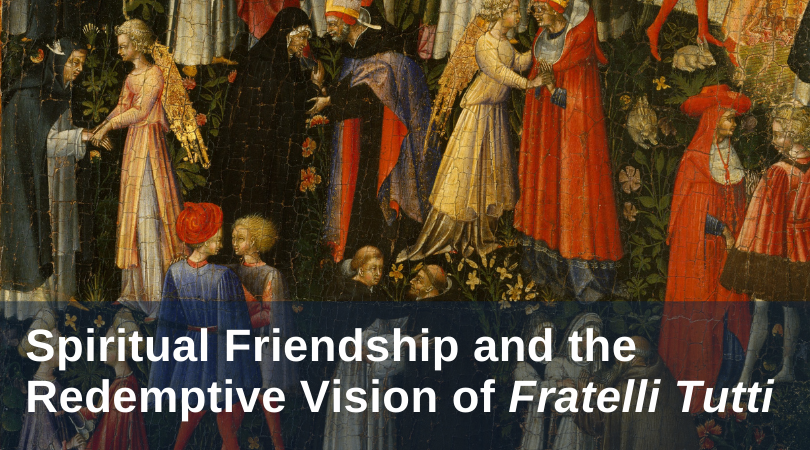
One of the oldest reflections on friendship is Plato’s Lysis in which Socrates suggests that a friend “somehow belong[s] to his beloved either in his soul or in some characteristic, habit, or aspect of his soul.”[1] Developing this intuition, Aristotle, later argued that in a perfect friendship, friends must “live together,”[2] by sharing deeply in one another’s inner life, famously describing such a friend as “another self.”[3] True friends are those whose hearts and minds pursue the same thing—goodness for Plato and virtue for Aristotle.
Christian theology also understands friendship as the harmonizing of different hearts according to a shared love. St. Augustine’s Confessions could be read as a reflection on the harmful and healing effects of friendship. Centuries later, the English Abbot Aelred of Rievaulx, inspired by Augustine’s account, wrote his classic work Spiritual Friendship. Speaking to his confrere and friend, Ivo, he writes: “Here we are, you and I, and I hope a third, Christ, is in our midst.”[4] For Aelred, Christian friendship is not rooted principally in a transcendent conception of the Good or a life of human virtue, but in the shared love of God. Aelred and Ivo are deeper friends to one another because each is first a friend to Christ, who is their shared love and the harmony binding their inner lives.
This understanding guides Pope Francis’ third encyclical, Fratelli Tutti, “On Fraternity and Social Friendship.” We often think of friendship as preferential love—as something quite different from the broad concern indicated by the term “social friendship.” This perceived difference led Soren Kierkegaard centuries after Aelred to conclude that Christian love must be commanded by Christ (“You shall love your neighbor”) precisely because it is intrinsically opposed to the more natural love of friendship.
Thankfully, Pope Francis does not see Christian love (charity or agape) as intrinsically opposed to friendship. Instead, he proposes that we increase our capacity for friendship to the point of a universal fraternal love. The idea of a social love that extends beyond my family or close friends to those I hardly know, those I may never meet, and even my enemies, depends on rooting our understanding of Christian friendship in our mutual belonging to Christ. Because each is a child of God (§271), each can be a friend to all.
This “fraternal openness” (§1) is the defining disposition of the encyclical’s redemptive anthropology. It envisions the human being not as an individual, defined by differences from others, but as a person who is a being-in-relation. If, as Aelred proposed, “God is friendship,” and if, through Christ, we participate in that loving Trinitarian friendship, then Christians are called to friendship with all. Of course, what is actual in God can only begin as an aspiration in us, but it is an aspiration to which Pope Francis call us repeatedly (§§8, 55, 157, 216).
Francis’ repeated calls to “openness” remind us of another deep truth: love draws us out of ourselves. St. Thomas Aquinas speaks of love as “ecstasy,”[5] through which we are fundamentally open to the world, God, and our neighbor. That same love, rightly interpreted, “impels us toward universal communion” (§95) in which no one is left out, not the wounded stranger, the unnamed immigrant, or the death row inmate.
The image of such self-transcending friendship is the Good Samaritan (§56). Its direct consequence is what the Pope calls “political charity,”[6] the collective efforts of women and men “in initiating processes of fraternity and justice for all” (§180).
Such a vision is redemptive because it does not seek merely to describe us as we are, but also to enable us, in cooperation with divine grace, to be sources of healing for one another. It is a high bar and Pope Francis knows it. Social friendship can only be the result of “personal conversion” (§114). In this we see the enriching reversal introduced by Christian friendship: for the Greeks, I must learn to love myself well in order to love another well; for the Christian, in discovering I can love the stranger, I learn also of the Love that has already befriended me.
Like what you read? Submit your email below to have our newest blogs delivered directly to your inbox each week.
Featured image: Paradise (1445) by Giovanni di Paolo; courtesy of the Metropolitan Museum of Art via Wikimedia Commons; PD-Old.
[1] Plato, Lysis, 222a
[2] NE, 1157b20
[3] Aristotle, Nicomachean Ethics, 1166a33
[4] Aelred of Rievaulx, Spiritual Friendship, 1:1. For a more focused treatment of this text see Nathaniel Peters, “God is Friendship” at Church Life Journal.
[5] ST I-II, q.28, a.3
[6] A term he takes from Pius XI in his Address to the Italian Catholic Federation of University Students (1927)


